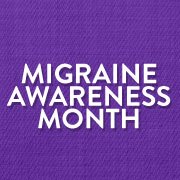Migraine is not a headache. I know that sounds weird, so let me explain. Saying a migraine is a headache would be like saying Chixenpox is an "itch", or saying getting hit in the shin is a "bruise", or saying bronchitis is a "cough", or saying the stomach flu is a "vomit". I may be getting a little carried away with my analogies, but hopefully I made my point.
Headache is a symptom associated with migraines. It is how most of us with migraine suffer. The classic migraine presents with one-sided head pain that is pulsating in nature accompanied by nausea, sensitivity to light and sound. However, not all migrainuers present the same way. Unfortunately, headaches aren't our only problem. Some people present with cyclical vomiting. Some people go blind. Some people have abdominal migraines with intense abdominal pain and nausea. Some people have stroke-like symptoms. We are all made just a little differently, and so we all present a little differently, which makes us a difficult group to diagnose, treat, and understand.
You are probably wondering if it isn't a headache what is it? It is a neurologic/neurovascular disorder. One thought is that there is an increased excitability of the cerebral cortex that coincides with abnormal control of pain neurons in a specific part of the brainstem. They believe the malfunction begins in the brain and spreads to blood vessels. There is some uncertainty as to whether the neuronal mechanisms or blood vessels play a greater role. There is also some evidence that altered levels of nuerotransmitters may be involved in the migraine process.
To complicate migraines and their treatment more, migraine also comes with a slew of comorbidities (the presence of other conditions) that include cardiocerebral, vascular, psychiatric, metabolic, and neurologic pathologies. Much more research is needed in this field so that we migrainuers can be adequately be cared for. June is migraine awareness month and this migrainuer has spent many a day trying to figure out my own body enough to be able to manage my own migraines. I know that every individual is different with different comorbidities and management strategies. After successfully managing mine for a little over a year I created my site in an attempt to help others that may benefit from my strategy and migraine plan or anything else I can provide to a fellow sufferer. I am not naïve enough to believe that my plan will help everyone, but only hope it will help someone...although it would be wonderful if it could help everyone:)!
If you feel inclined to support further research and support for migraines here are some great migraine organizations:
1. Donations to the Migraine Research Foundation can be made to help the continued search for a better understanding and treatment for migraines.
2. Donations can also be made to the American Headache and Migraine Association which is an organization which attempts to help empower patients, families and friends through education, support, advocacy, and research.
Let's do whatever we can to end the suffering as a result of this illness!
Headache is a symptom associated with migraines. It is how most of us with migraine suffer. The classic migraine presents with one-sided head pain that is pulsating in nature accompanied by nausea, sensitivity to light and sound. However, not all migrainuers present the same way. Unfortunately, headaches aren't our only problem. Some people present with cyclical vomiting. Some people go blind. Some people have abdominal migraines with intense abdominal pain and nausea. Some people have stroke-like symptoms. We are all made just a little differently, and so we all present a little differently, which makes us a difficult group to diagnose, treat, and understand.
You are probably wondering if it isn't a headache what is it? It is a neurologic/neurovascular disorder. One thought is that there is an increased excitability of the cerebral cortex that coincides with abnormal control of pain neurons in a specific part of the brainstem. They believe the malfunction begins in the brain and spreads to blood vessels. There is some uncertainty as to whether the neuronal mechanisms or blood vessels play a greater role. There is also some evidence that altered levels of nuerotransmitters may be involved in the migraine process.
To complicate migraines and their treatment more, migraine also comes with a slew of comorbidities (the presence of other conditions) that include cardiocerebral, vascular, psychiatric, metabolic, and neurologic pathologies. Much more research is needed in this field so that we migrainuers can be adequately be cared for. June is migraine awareness month and this migrainuer has spent many a day trying to figure out my own body enough to be able to manage my own migraines. I know that every individual is different with different comorbidities and management strategies. After successfully managing mine for a little over a year I created my site in an attempt to help others that may benefit from my strategy and migraine plan or anything else I can provide to a fellow sufferer. I am not naïve enough to believe that my plan will help everyone, but only hope it will help someone...although it would be wonderful if it could help everyone:)!
If you feel inclined to support further research and support for migraines here are some great migraine organizations:
1. Donations to the Migraine Research Foundation can be made to help the continued search for a better understanding and treatment for migraines.
2. Donations can also be made to the American Headache and Migraine Association which is an organization which attempts to help empower patients, families and friends through education, support, advocacy, and research.
Let's do whatever we can to end the suffering as a result of this illness!


 RSS Feed
RSS Feed
